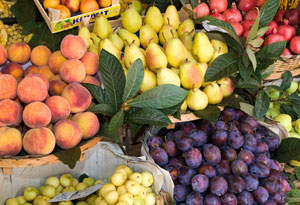Is Organic Food Worth the Price?

Photo: Getty Images
As the recession lingers on, food writer Nina Planck tackles this controversial question.
When I was a kid, my summer job was selling vegetables at roadside stands and farmers' markets near our Virginia farm. "Is this organic?" customers would ask. "No," I'd say, "but we don't use pesticides, our chickens run free on grass, and our produce is fresh and local." I was barefoot, smudgyfaced, and barely 10 years old, which may or may not have enhanced my credibility. But I usually made the sale. We didn't bother to go organic officially because it involved a lot of red tape and extra expense, and at the time, there were multiple standards by multiple certifying bodies. Our food was certainly green, and our little farm thrived. Today, however, the term organic is defined by a strict set of federal regulations. Crops bearing the USDA organic seal of approval are raised without synthetic pesticides, petroleum-based fertilizers, or sewage sludge (semisolid leftovers from wastewater plants used as fertilizer). Organic animals consume organic feed and must have access to the outdoors. They are not treated with antibiotics or growth hormones. The organic label also means your food was not genetically engineered or treated with radiation to prolong shelf life.
These all seem like admirable standards with the consumer's best interests in mind. So, understandably, it came as quite a shock to health-minded shoppers when the British government's Food Standards Agency released a review last year pronouncing organic produce to be no more nutritious than the conventional kind. Organics advocates called the UK review flawed and incomplete, and its authors biased. They contended that the study didn't include recent data showing that organic food delivers many advantages (less exposure to potentially harmful chemicals, for example), and that the concluding statement buried any pro-organic news the researchers did find (like the fact that organic produce contains more of certain beneficial minerals). They claimed that some of the studies included in the review were poorly designed, others seriously outdated. "These findings are wrong," Patrick Holden, director of the Soil Association, Britain's leading organic organization, says flatly. "Organic food is better for the planet, and it's better for you."
New (and old) reasons to go organic



